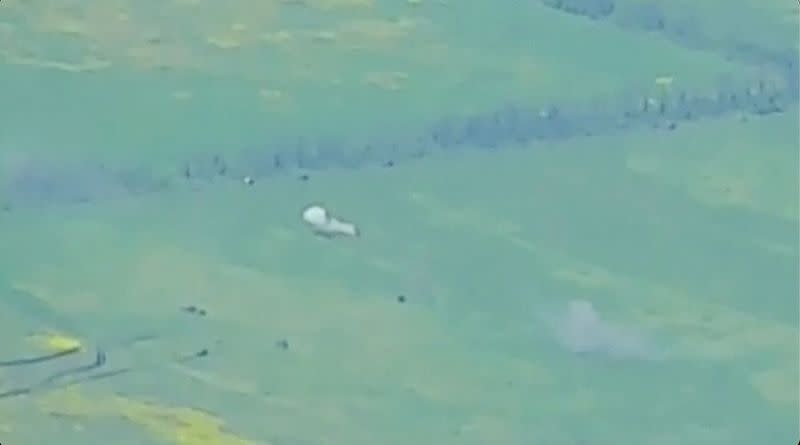Russia says it thwarted major Ukrainian offensive, Kyiv says Moscow spreads lies
By Guy Faulconbridge
MOSCOW (Reuters) -Russia said on Monday its forces had thwarted a major Ukrainian offensive at five points along the front in the Ukrainian region of Donetsk and killed hundreds of troops while Ukraine accused Moscow of spreading lies.
It was not immediately clear whether or not the attack represented the start of a Ukrainian counteroffensive which Kyiv has been promising for months to drive out Russian forces after the invasion of February 2022.
Russia's defence ministry said Ukraine had attacked on Sunday morning with six mechanised and two tank battalions in southern Donetsk, where Moscow has long suspected Ukraine would seek to drive a wedge through Russian-controlled territory.
"On the morning of June 4, the enemy launched a large-scale offensive in five sectors of the front in the South Donetsk direction," the defence ministry said in a statement posted on Telegram at 1:30 a.m. Moscow time (2230 GMT).
"The enemy's goal was to break through our defences in the most vulnerable, in its opinion, sector of the front," it said. "The enemy did not achieve its tasks, it had no success."
Reuters was unable to immediately verify the Russian statement and the Ukrainian defence ministry and military did not immediately respond to written requests for comment.
The commander of Ukraine's ground forces, Oleksandr Syrskyi, said on Monday that Ukrainian forces continued "moving forward" near the long-contested city of Bakhmut in northern Donetsk. He made no comment on the counter-offensive.
The daily report from Ukraine's General Staff said only that there were 29 combat clashes in the Donetsk and Luhansk regions of eastern Ukraine.
Ukraine's Centre for Strategic Communications did not address the Russian statement directly but said, without providing evidence, that Russia would seek to spread lies.
"To demoralize Ukrainians and mislead the community (including their own population), Russian propagandists will spread false information about the counteroffensive, its directions, and the losses of the Ukrainian army," it said.
Ukrainian Defence Minister Oleksii Reznikov published a cryptic message on Twitter on Sunday, quoting Depeche Mode's track "Enjoy the Silence".
Russian war bloggers reported fighting at several points across the front, particularly around Vuhledar, some 150 km (93 miles) southwest of Bakhmut.
FIGHTING
Russia's defence ministry released video of what it said showed several Ukrainian armoured vehicles in a field blowing up after being hit.
Russian forces killed 250 Ukrainian troops as well as destroying 16 tanks, three infantry fighting vehicles and 21 armoured combat vehicles, the ministry said.
Russian Chief of the General Staff Valery Gerasimov, who is in charge of Moscow's military operation in Ukraine, was in the area at the time of the Ukrainian attack, the ministry said.
Prominent Russian military blogger Semyon Pegov, who blogs under the name War Gonzo, said Ukrainian forces were attacking near Velyka Novosilka, a village west of Vuhledar.
"There is a tough fight going on."
Other Russian military bloggers reported also heavy fighting on Monday morning near Bakhmut, nearby Soledar and Vuhledar. Reuters could not independently verify the reports.
COUNTER-OFFENSIVE?
For months, Ukraine has been preparing for a counter-offensive against Russian forces which officials in Kyiv and CIA Director William Burns have said will pierce Russian President Vladimir Putin's hubris.
Ukrainian President Volodymyr Zelenskiy told the Wall Street Journal in an interview published on Saturday that he was ready to launch the counteroffensive but tempered a forecast of success with a warning that it could take some time and come at a heavy cost.
"I don't know how long it will take," he told The Journal. "To be honest, it can go a variety of ways, completely different. But we are going to do it, and we are ready."
After seeking tens of billions of dollars of Western weapons to fight Russian forces, the success or failure of the counter-offensive is likely to influence the shape of future Western diplomatic and military support for Ukraine.
Ukraine has in recent weeks sought to weaken Russian positions but its specific plans have been shrouded in secrecy as it seeks to strike yet another blow against the much larger military of Russia.
Moscow was last month struck by drones which Russia said was a Ukrainian terrorist attack while pro-Ukrainian forces have repeatedly crossed into Russia proper in recent days in the Belgorod region.
After a two-month lull, Russia has launched hundreds of drones and missiles on Ukraine since early May, chiefly on Kyiv, with Ukraine saying it was targeting military facilities but also hitting residential areas.
WAR IN UKRAINE
Putin sent troops into Ukraine on February 24 last year in what the Kremlin expected to be swift operation but its forces suffered a series of defeats and had to move back and regroup in swathes of eastern Ukraine.
Russia now controls at least 18% of what is internationally recognised to be Ukrainian territory, and has claimed four regions of Ukraine as Russian territory.
For months, tens of thousands of Russian troops have been digging in along a front line which stretches for around 600 miles (1,000km), bracing for a Ukrainian attack which is expected to try to cut Russia's so-called land bridge to the Crimean peninsula, which Russia annexed in 2014.
Ukraine vows to eject every last Russian soldier from its territory, and casts the invasion as an imperial-style land grab by Russia.
Russia says the West is fighting a hybrid war against Russia to sow discord and ultimately carve up Russia's vast natural resources, allegations that Western leaders deny.
(Writing by Guy Faulconbridge in Moscow, Lidia Kelly in Melbourne and David Ljunggren in Ottawa; editing by Diane Craft, Lincoln Feast and Philippa Fletcher)

 Yahoo News
Yahoo News 


